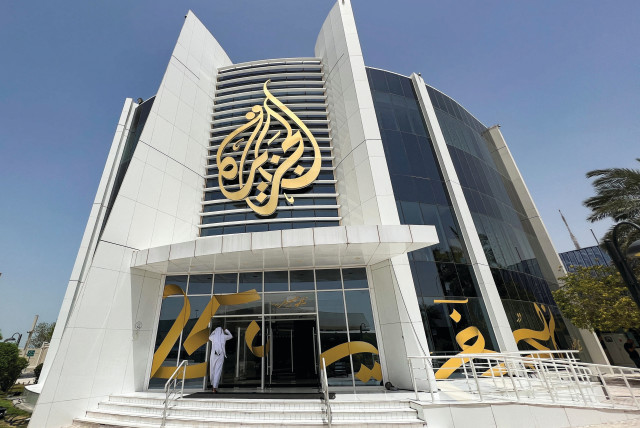Knesset passes law aimed at silencing Al Jazeera, White House 'concerned'
Netanyahu, who is recovering from surgery, said he will act immediately to close Al Jazeera according to the procedure laid out in the law.
The Knesset passed into law on Monday a bill aimed at shutting down the operations of the Qatari state-funded news outlet Al Jazeera in Israel.
The Likud stated on Monday that Prime Minister Benjamin Netanyahu had spoken with Coalition Whip Ofir Katz to ensure that the bill passes and that the prime minister will act immediately to close Al Jazeera according to the procedure laid out in the law.
According to the law, if the prime minister becomes convinced that content broadcast by foreign media “harms in a real way” the nation’s security, the communications minister can bring a resolution to the government to block that media’s television broadcast in Israel, shut down its offices, seize equipment used for its broadcasts, and block its website under certain conditions.
Communications Minister Shlomo Karhi led the government’s effort to pass the law after reports emerged that the Shin Bet (Israel Security Agency) and IDF had warned that Al Jazeera broadcasts were revealing the location of military forces, and endangering soldiers.
The law included several hurdles due to the concern over a chilling effect on foreign media and harm to press freedom: First, for the government to approve the move, all of Israel’s security agencies must provide an opinion and present it to the government, including the “factual foundations” that prove that there is “real harm” to national security; second, the decision will only apply for 45 days, needs to be re-approved every 45 days, and expires on July 31; third, the decision must be brought before the president or vice president of a regional court within 24 hours, and the judges have three days to rule on “changing” the decision or limiting the period of its applicability.
Law requires gov to clear a number of hurdles before banning station
Knesset legal advisers insisted on the provision of judicial review, arguing that if this is not part of the bill, it will be deemed unconstitutional by Israel’s Supreme Court. Karhi and other members of the coalition argued during the legislative process that the judicial system should not be given this power but eventually agreed to leave the provision in the bill’s final version.
“There will be no freedom of expression for organs of the Hamas in Israel. Al Jazeera will be shut down in the coming days,” Karhi said in a written statement after the bill passed into law.
“We brought an efficient and quick tool to act against those who use the freedom of the press to harm Israeli security and IDF soldiers and incite terror in wartime,” Karhi said.
The opposition party United Right, which left the government in March, announced that it would support the bill. MK Ze’ev Elkin said that it was “prohibited to enable a body that disseminates blatant anti-Israeli propaganda,” and that it was “too bad that the prime minister delayed closing the station at the beginning of the war.”
MKs from the two Israeli Arab parties, Hadash-Ta’al and Ra’am, opposed the bill during the debate in the Knesset plenum, arguing that the reason Israel wanted to block Al Jazeera’s Israeli broadcasts was to hide the extent of destruction and civilian casualties in Gaza.
“Citizens of Israel, they are trying to put you under a cognitive siege… to block information about things being done in your name,” said Hadash-Ta’al MK Aida Touma-Sliman.
The government in December approved similar emergency regulations that would have temporarily shut down Al Jazeera, but Prime Minister Benjamin Netanyahu reportedly decided not to do so for it not to negatively affect hostage negotiations being facilitated by Qatar. Hadash-Ta’al MK Ayman Odeh argued that the prime minister agreed this time to shut it down despite ongoing negotiations to delay a hostage deal that could threaten the stability of his government.
Right-wing opposition MKs from the Yisrael Beytenu Party attacked the bill as not being harsh enough and for the six-month delay in passing it.
Labor MK Gilad Kariv said that the bill was a “joke,” since Netanyahu was the “father” of the idea to involve Qatar in providing funding to Hamas over the years. Netanyahu continues to cooperate with the Qataris, and the real problem was not Al Jazeera but Qatar’s support of Hamas, Kariv claimed. He added that in his opinion, the move to close Al Jazeera was coordinated with the Qataris.
Stephen Dujarric, who is the spokesperson for United Nations Secretary General Antonio Guterres, said he was concerned by the law’s passage.
“Any limitation on the right of journalists to operate anywhere in the world is of deep concern. And we’re seeing, frankly, all over the world, the negative trend in that regard,” Dujarric told reporters in New York.
White House press secretary Karine Jean-Pierre said the US was concerned by the Knesset’s passage of the law.
“We believe in the freedom of the press. It is critically important. The United States supports the critically important work journalists around the world do.
“That includes those who are reporting in the conflict in Gaza. So we believe that work is important, the freedom of the press is important,” she told reporters in Washington.
Tovah Lazaroff contributed to this report.
Jerusalem Post Store
`; document.getElementById("linkPremium").innerHTML = cont; var divWithLink = document.getElementById("premium-link"); if (divWithLink !== null && divWithLink !== 'undefined') { divWithLink.style.border = "solid 1px #cb0f3e"; divWithLink.style.textAlign = "center"; divWithLink.style.marginBottom = "15px"; divWithLink.style.marginTop = "15px"; divWithLink.style.width = "100%"; divWithLink.style.backgroundColor = "#122952"; divWithLink.style.color = "#ffffff"; divWithLink.style.lineHeight = "1.5"; } } (function (v, i) { });

